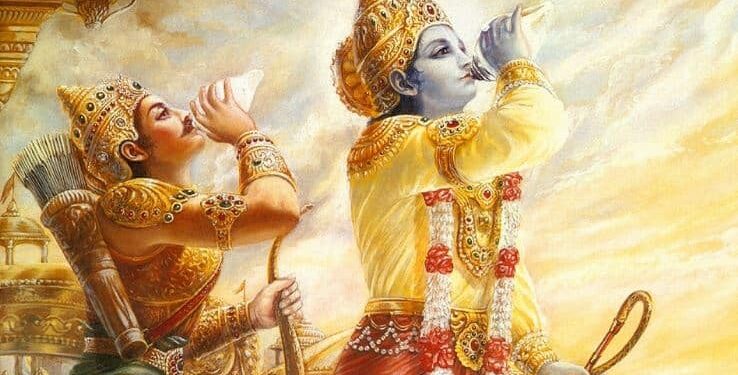TEXTS 37-38
yady apy ete na paśyanti
lobhopahata-cetasaḥ
kula-kṣaya-kṛtaṁ doṣaṁ
mitra-drohe ca pātakam
kathaṁ na jñeyam asmābhiḥ
pāpād asmān nivartitum
kula-kṣaya-kṛtaṁ doṣaṁ
prapaśyadbhir janārdana
SYNONYMS
yadi—if; api—even; ete—they; na—do not; paśyanti—see; lobha—by greed; upahata—overpowered; cetasaḥ—their hearts; kula-kṣaya—in killing the family; kṛtam—done; doṣam—fault; mitra-drohe—in quarreling with friends; ca—also; pātakam—sinful reactions; katham—why; na—should not; jñeyam—be known; asmābhiḥ—by us; pāpāt—from sins; asmāt—these; nivartitum—to cease; kula-kṣaya—in the destruction of a dynasty; kṛtam—done; doṣam—crime; prapaśyadbhiḥ—by those who can see; janārdana—O Kṛṣṇa.
TRANSLATION
O Janārdana, although these men, their hearts overtaken by greed, see no fault in killing one’s family or quarreling with friends, why should we, who can see the crime in destroying a family, engage in these acts of sin?
PURPORT
A kṣatriya is not supposed to refuse to battle or gamble when he is so invited by some rival party. Under such an obligation, Arjuna could not refuse to fight, because he had been challenged by the party of Duryodhana. In this connection, Arjuna considered that the other party might be blind to the effects of such a challenge. Arjuna, however, could see the evil consequences and could not accept the challenge. Obligation is actually binding when the effect is good, but when the effect is otherwise, then no one can be bound. Considering all these pros and cons, Arjuna decided not to fight.
TEXT 39
kula-kṣaye praṇaśyanti
kula-dharmāḥ sanātanāḥ
dharme naṣṭe kulaṁ kṛtsnam
adharmo ‘bhibhavaty uta
SYNONYMS
kula-kṣaye—in destroying the family; praṇaśyanti—become vanquished; kula-dharmāḥ—the family traditions; sanātanāḥ—eternal; dharme—religion; naṣṭe—being destroyed; kulam—family; kṛtsnam—whole; adharmaḥ—irreligion; abhibhavati—transforms; uta—it is said.
TRANSLATION
With the destruction of the dynasty, the eternal family tradition is vanquished, and thus the rest of the family becomes involved in irreligion.
PURPORT
In the system of the varṇāśrama institution there are many principles of religious traditions to help members of the family grow properly and attain spiritual values. The elder members are responsible for such purifying processes in the family, beginning from birth to death. But on the death of the elder members, such family traditions of purification may stop, and the remaining younger family members may develop irreligious habits and thereby lose their chance for spiritual salvation. Therefore, for no purpose should the elder members of the family be slain.
TEXT 40
adharmābhibhavāt kṛṣṇa
praduṣyanti kula-striyaḥ
strīṣu duṣṭāsu vārṣṇeya
jāyate varṇa-saṅkaraḥ
SYNONYMS
adharma—irreligion; abhibhavāt—having become predominant; kṛṣṇa—O Kṛṣṇa; praduṣyanti—become polluted; kula-striyaḥ—family ladies; strīṣu—by the womanhood; duṣṭāsu—being so polluted; vārṣṇeya—O descendant of Vṛṣṇi; jāyate—comes into being; varṇa—saṅkaraḥ—unwanted progeny.
TRANSLATION
When irreligion is prominent in the family, O Kṛṣṇa, the women of the family become polluted, and from the degradation of womanhood, O descendant of Vṛṣṇi, comes unwanted progeny.
PURPORT
Good population in human society is the basic principle for peace, prosperity and spiritual progress in life. The varṇāśrama religion’s principles were so designed that the good population would prevail in society for the general spiritual progress of state and community. Such population depends on the chastity and faithfulness of its womanhood. As children are very prone to be misled, women are similarly very prone to degradation. Therefore, both children and women require protection by the elder members of the family. By being engaged in various religious practices, women will not be misled into adultery. According to Cāṇakya Paṇḍita, women are generally not very intelligent and therefore not trustworthy. So the different family traditions of religious activities should always engage them, and thus their chastity and devotion will give birth to a good population eligible for participating in the varṇāśrama system. On the failure of such varṇāśrama-dharma, naturally the women become free to act and mix with men, and thus adultery is indulged in at the risk of unwanted population. Irresponsible men also provoke adultery in society, and thus unwanted children flood the human race at the risk of war and pestilence.

















